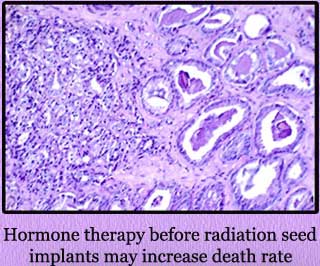
The largest cohort study till date, it included nearly 1709 men over 70 years of age with localized prostate cancer. From 1991 to 2005, these men had either been treated with neoadjuvant hormone therapy (NHT) and brachytherapy or with just brachytherapy at centres within the 21st Century Oncology consortium. The study goes on to reveal that men who were treated with brachytherapy alone as against those administered hormone therapy followed by brachytherapy had lowered death rate risks.
A radiation oncologists places small radioactive seeds into the prostate to kill the cancer cells while the man is sedated in Brachytherapy.
Amy Fox, M.D., lead author of the study and a radiation oncology resident at the Harvard Radiation Oncology Program in Boston, commented, “Our study shows that for men over 70 with early-stage prostate cancer, androgen deprivation therapy as a form of treatment may do more harm than good. n older patients, the risks of androgen deprivation need to be carefully weighed by doctors when designing the proper treatment plan.â€
The researcher additionally asserted, “These results are particularly interesting, since two previous studies that examined similar populations contradicted each other in terms of how hormone therapy impacts the risk of death among prostate cancer patients in this age group.â€
The new research shows that along with other known side effects, hormone therapy may have negative effects on survival as well. A common hormone therapy Androgen deprivation therapy is used in the treatment of prostate cancer. It functions by reducing the levels of androgen, a male hormone. This in turn shrinks the prostate or slows down the growth of prostate cancer.
However the study shows that men in the older age group with localized prostate cancer when treated with both NHT and brachytherapy had a 20% increased risk of dying in comparison to men who were not treated with NHT.
Researchers indicate that these effects must be considered while selecting treatment options since NHT doesn’t actually improve a patient’s chances of being cured.
The study was presented on September 23, 2008, at the American Society for Therapeutic Radiology and Oncology’s 50th Annual Meeting in Boston.
